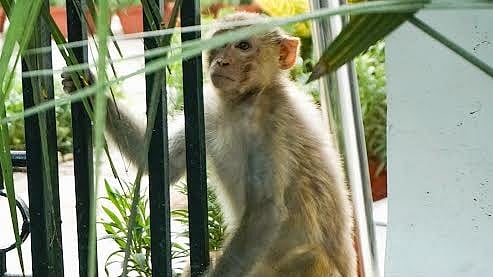
Amidst the heatwaves this year, a dehydrated rhesus macaque was rescued from the PM house.
Credit: Wildlife SOS
Mumbai: Human-primate conflict remains a pressing conservation challenge, affecting both ecological balance and public safety, says the Wildlife SOS on the eve of World Monkey Day, which falls on 14 December.
In India, monkeys have been facing many conservation related issues.
Of the 22 primate species inhabiting India, a few such as the rhesus macaque (Macaca mulatta), and grey langur (Semnopithecus entellus) have adapted to human-dominated landscapes. Due to this adaptation, they try to avail food items through raiding and snatching, thereby facing persecution from humans.
Rhesus macaques are spotted more commonly in cities such as Delhi, Agra, Vadodara, Chandigarh, Lucknow and Varanasi, to name a few, where they find it easier to raid garbage bins and rely on being fed by humans.
Kartick Satyanarayan, Co-founder and CEO, Wildlife SOS informed, “The readily available food that the macaques get, does not do much good for the animal. It causes hormonal imbalance, increases stress, and modifies their behaviour and reproductive patterns. This can commonly be termed as the urban wildlife syndrome.”
This phenomenon is caused by the ever-increasing encroachment of wild habitats that happens due to deforestation for agriculture and urbanisation. Without their natural homes, monkeys have made their way into human settlements. As monkeys are mostly arboreal animals, they find themselves in distress situations such as being stuck on electric poles, barbed wires, nets and even face the threat of vehicular accidents.
Every year, Wildlife SOS rescues hundreds of rhesus macaque monkeys from Delhi, Agra, and Vadodara with the help of its rapid response units in these cities. The monkeys have been rescued from stressful situations like a practice net of a school, from atop a boundary wall with the help of the Delhi Fire Service, as well as from the Prime Minister’s house.
Geeta Seshamani, Co-founder and Secretary, Wildlife SOS said, “These instances show how fragile their situation is, and how much encroachment can impact the lives of these primates. We always urge people to contact our rescue helplines (9871963535) if they see any monkey in distress. It is our primary goal to ensure and promote co-existence between humans and wild animals.”